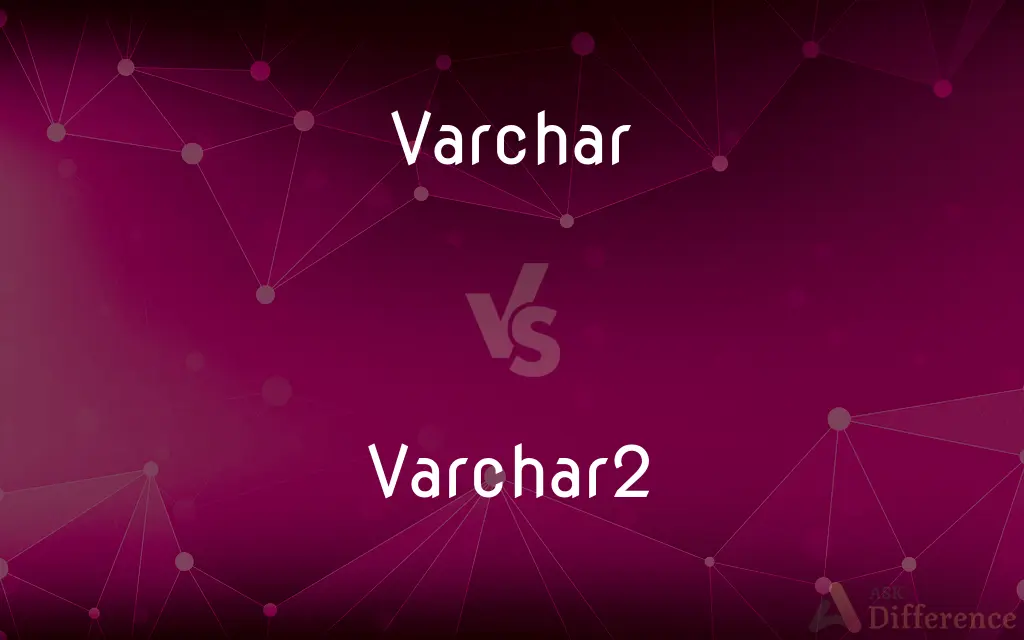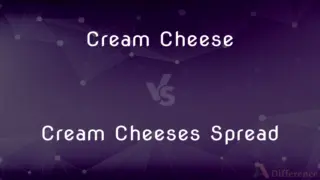Varchar vs. Varchar2 — What's the Difference?
By Tayyaba Rehman — Published on November 21, 2023
Varchar and Varchar2 are data types in databases for variable-length character strings; Varchar2 is more specific to Oracle with defined behavior for NULL and string length.

Difference Between Varchar and Varchar2
Table of Contents
ADVERTISEMENT
Key Differences
Varchar is a commonly used data type across many relational database systems. It allows storage of variable-length character strings. Varchar2, however, is a data type specific to Oracle databases and is an enhancement over Varchar.
In terms of functionality, Varchar and Varchar2 can often be used interchangeably. However, Oracle recommends using Varchar2 when designing Oracle databases, as the behavior of Varchar might change in the future, while Varchar2 has a consistent and defined behavior.
Both Varchar and Varchar2 allow users to define the maximum length for the character strings they intend to store. Yet, the distinction lies in how each treats NULL values and spaces. In Oracle, Varchar2 ensures that there's no difference between a NULL value and an empty string.
Another aspect to consider is future compatibility. Oracle has hinted that Varchar's behavior may be subject to change in subsequent releases. As a result, database designers and administrators are encouraged to use Varchar2, ensuring stability and predictability in how data is handled.
From a naming perspective, it's evident that Varchar2 is a successor or an improved version over the original Varchar. Oracle's push towards Varchar2 over Varchar implies the commitment to offering robust and reliable database solutions.
ADVERTISEMENT
Comparison Chart
Database Compatibility
Many relational database systems
Specific to Oracle
Future Behavior
Might change in future Oracle releases
Defined and consistent behavior
Treatment of NULL
Might differ between versions
No difference between NULL and empty string
Recommendation
Not recommended for new Oracle designs
Recommended for Oracle databases
Version
Original version
Enhanced or successor version
Compare with Definitions
Varchar
A data type for variable-length character strings.
The user's name was stored in a Varchar column.
Varchar2
An enhanced version of the Varchar data type.
Varchar2 is the improved version, offering more clarity in data handling than Varchar.
Varchar
Capable of storing diverse characters.
The Varchar column can store names with special characters.
Varchar2
Ensures consistency between NULL values and empty strings.
With Varchar2, there's no ambiguity between an empty entry and a NULL value.
Varchar
Used across many relational database systems.
Varchar is a common choice for text fields in databases.
Varchar2
Oracle's recommended choice over Varchar for new designs.
For the new Oracle database design, we opted for Varchar2 fields.
Varchar
Allows definition of maximum string length.
The database column, defined as Varchar(50), limits entries to 50 characters.
Varchar2
Provides stability and predictability in Oracle databases.
Using Varchar2 ensures that the data behavior remains consistent across updates.
Varchar
Earlier version of variable-length character data type in Oracle.
Before Varchar2 became prominent, Varchar was used in Oracle.
Varchar2
An Oracle-specific data type for variable-length character strings.
In the Oracle database, the employee's last name was stored in a Varchar2 column.
Varchar
A text field of indeterminate length in a database, as opposed to the traditional fixed-length field.
Common Curiosities
How is Varchar2 different from Varchar?
Varchar2 is specific to Oracle with defined behavior for NULLs and string length, while Varchar is more general.
Can I use Varchar and Varchar2 interchangeably in Oracle?
While often used interchangeably, Oracle recommends Varchar2 for its defined and consistent behavior.
Why might Varchar's behavior change in future Oracle releases?
Oracle has suggested that Varchar's behavior might be adjusted, urging users to choose Varchar2 for stability.
Is Varchar2 only available in Oracle databases?
Yes, Varchar2 is specific to Oracle, while Varchar is found in many relational database systems.
Why is Varchar2 named as such?
Varchar2 is an enhanced or successor version of the original Varchar in Oracle.
What is the purpose of the Varchar data type?
Varchar is used to store variable-length character strings in databases.
Can Varchar and Varchar2 columns store special characters?
Yes, both can store diverse characters, but always consider the database's character set.
Is it risky to use Varchar in new Oracle database designs?
Given Oracle's guidance, it's advisable to use Varchar2 for new designs to ensure future compatibility.
Do other database systems have equivalents to Varchar2?
While other systems have variable-length character data types like Varchar, Varchar2's specific behavior is unique to Oracle.
How do Varchar and Varchar2 treat NULL values differently in Oracle?
In Oracle, Varchar2 ensures there's no distinction between a NULL value and an empty string, which might not be the case with Varchar.
Are there length limits for Varchar and Varchar2?
Both allow users to define a maximum length for the strings, but the specific limits can vary based on the database version and system.
Can I convert a Varchar column to Varchar2 in Oracle?
Yes, you can modify the column type, but always backup data and test changes first.
Will Varchar be deprecated in Oracle?
Oracle has not explicitly stated deprecation but recommends Varchar2 for its consistent behavior.
What happens if a string exceeds the defined length in a Varchar or Varchar2 column?
An error occurs, and the data isn't stored unless the column definition is adjusted.
Are there performance differences between Varchar and Varchar2 in Oracle?
Generally, the performance is similar, but Varchar2 ensures more predictable behavior.
Share Your Discovery

Previous Comparison
Bronchitis vs. Whooping Cough
Next Comparison
Cream Cheese vs. Cream Cheeses SpreadAuthor Spotlight
Written by
Tayyaba RehmanTayyaba Rehman is a distinguished writer, currently serving as a primary contributor to askdifference.com. As a researcher in semantics and etymology, Tayyaba's passion for the complexity of languages and their distinctions has found a perfect home on the platform. Tayyaba delves into the intricacies of language, distinguishing between commonly confused words and phrases, thereby providing clarity for readers worldwide.











































